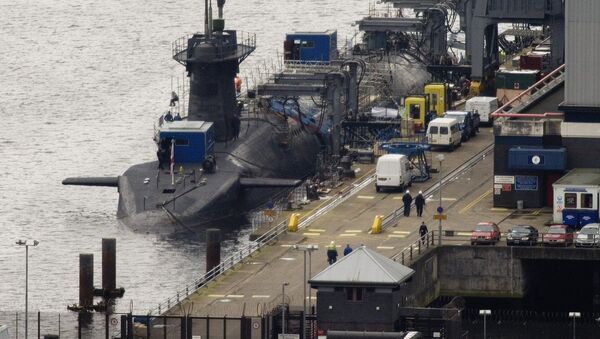GLASGOW, November 17 (Sputnik), Mark Hirst – The race to become the next leader of the Scottish Labour Party has exposed divisions over Britain's nuclear weapons program, Trident, with no clear official position emerging, the head of Scotland's Campaign for Nuclear Disarmament (CND) told Sputnik news agency.
"The Scottish Labour Party haven't taken a collective position on Trident for a long time, not for about two decades," Scottish CND head John Ainslie said to Sputnik.
"But the historical position was that they were opposed to Trident. There has never been a more recent debate to change that position, but obviously there is a difference of opinion between the candidates on what that position should be today," Ainslie added.
Three candidates have put themselves forward for the election of Scottish Labour leader — Neil Findlay and Sarah Boyack, both members of the Scottish parliament (MSP), and Jim Murphy, a member of the UK parliament (MP) at Westminster. Both MSPs have said they oppose Trident, whilst Murphy, the only Labour MP and former Labour Defense spokesman, has made clear his support for Trident.
The contest followed the surprise resignation of previous incumbent, Johann Lamont MSP, who accused the UK Labour leadership of treating Scotland like a "branch office".
Ainslie told Sputnik the contest exposed the divisions within the wider Labour Party with politicians in Edinburgh taking a different position to MP colleagues in the House of Commons.
"Neil Findlay has been actively speaking out against Trident for a long time and has a credible record of opposition to nuclear weapons," Ainslie said.
"Jim Murphy is completely on the other side of the argument. He has quite vocally taken a pro-Trident position in the past. Murphy has said that the Labour Party will never be a unilateralist party and the previous 1980s Labour position of supporting unilateralism was a mistake," he added.
The CND Scotland coordinator said the position of the third Scottish Labour leadership candidate, Sarah Boyack, remained unclear.
"Sarah Boyack's position is slightly less clear in that she has spoken out against nuclear weapons, but she hasn't actually voted against Trident when the topic came up in a key vote in the Scottish parliament," Ainslie said.
The UK Trident program, which encompasses four Vanguard-class submarines armed with Trident ballistic missiles, is based at Clyde Naval Base on Scotland's west coast.
In August, the parliament in Scotland debated once again the possible removal of Trident from Scottish shores, shortly before the independence referendum. The move was opposed by both Boyack and Findlay, but Ainslie told Sputnik the reason for that was not the candidates' position on Trident, but independence.
"Both Neil Findlay and Sarah Boyack went with the party line when Trident was last debated in the Scottish parliament in August. I think they would argue that because the parliamentary motion took such a clearly pro-independence line, in linking Trident to independence that was the reason they voted against. I don't necessarily agree with that, but that was the line that was taken," Ainslie said.
Ainslie stressed CND Scotland remained neutral in the contest to choose Scottish Labour's next leader, but told Sputnik the choice for members was clear.
"We are not backing one candidate or the other, but clearly the Labour Party have this choice before them on where they are going to go," Ainslie added.
None of the Scottish Labour Party candidates were available for interview when contacted by Sputnik and declined to respond to questions over the Party's position on Trident.

